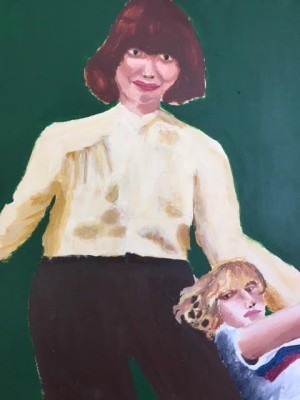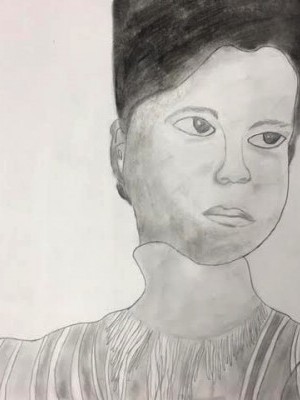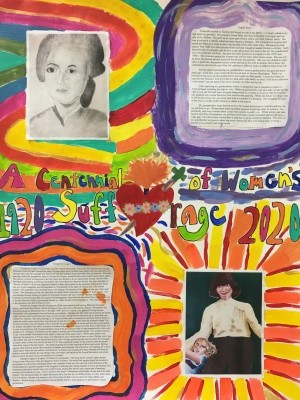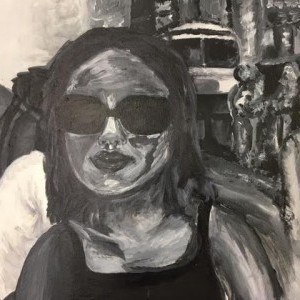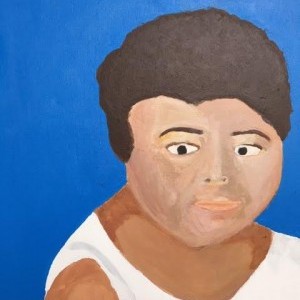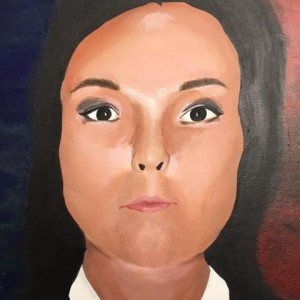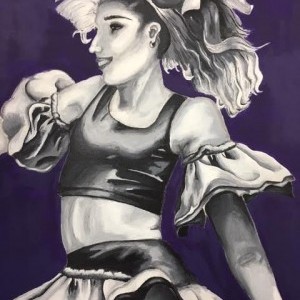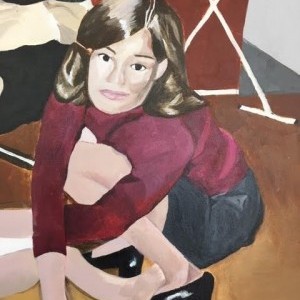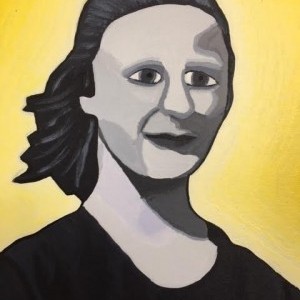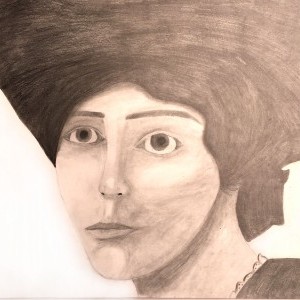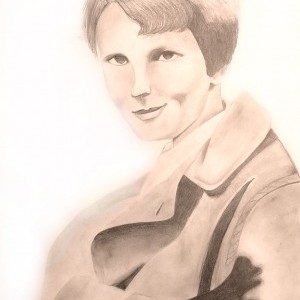Ruby Valla
Immaculate Heart High School | Los Angeles, CA | 9-12th Grade
Inspirational Family Member
Ma GrandMa
It was not possible to find the first female to vote in my family, so instead I talked to my dad about my grandma. My grandma, Susan Valla was born in Tacoma Washington and was one of six children. She grew up in a poor part of town with a very Irish Catholic family. She was a teacher at a Catholic school and later became a therapist. She moved to Los Angeles and raised my father as a single mother with the help of her older sister Patty. She married a man named Tony Valla for a short period of time and had a daughter named Michelle with him. Sadly Michelle had cerebral palsy, and lived in a care taking home for most of her life.
My grandmother was very politically involved. She attended many protests in Los Angeles in the 1970’s and 1980’s. She protested against the Vietnam war, and for many other liberal causes. She was also an artist, she painted artwork based on the protests she attended. She was very skilled in water color in particular, she painted mostly scenes and nature but with an abstract feel to them. She continued to paint for the rest of her life, painting in different styles in different times in her life.
For the object representing my grandmother I chose a pocket mirror she gave me many years ago. In the later years of her life she moved back to Tacoma Washington. While i was visiting her, she gave me this pocket mirror she bought at a flea market. I chose this object to represent her because I look at lot like my dad’s side of the family so when I look at my reflection in the mirror I can see parts of her and it reminds me of her and her life.
Historical Figure I Admire
Olympe de Gouges
Olympe de Gouges was born May 7, 1748 in Montauban, France. She was named Anne Olympe Mouisset Gouze but later changed her name. Olympe came from a middle class family, and was married at 16. Olympe had a son, her marriage was short lived with her husband dying soon after they got married. When her marriage ended she changed her name to Olympe de Gouges, moved to paris and vowed to never marry again. This shows a critical turning point in her life where she decided to be an independent woman.
Once in Paris, she began participating in political movements, she wrote about her ideas and beliefs. Her play, translating to “Slavery of Blacks”, was staged at a theatre in Paris and touched on the hardships black people faced. She also wrote a pamphlet, the title translates to, “Declaration of the rights of woman and of the female citizen.” This pamphlet was a response to the very popular “Declaration of the rights of man and of the male citizen.” She defended the king and especially the queen Marie Antoinette because many people were just blaming French corruption on Marie Antoinette because she was a woman. Olympe sided with the Girondins, a political party that was against the Montagnards; they believed there should be a nationwide vote to decide what the country’s government should be. After the fall of the Girondins in 1793, Olympe was sent to the guillotine, she died in Paris in 1793.
Olympe de Gouges was alive during one of the most turbulent and passion filled parts of European history, the French Revolution. Before moving to Paris, she lived in Montauban, France; Montauban was known for being an intellectual city. In the later 1700’s the town started to be against the King because Montauban was a Protestant town and the king was Catholic. Olympe may have had such a passion for human rights, and been able to articulate her ideals so well into her writing, because she grew up in a town that was centered on intellect. Her early marriage at 16 would not have been uncommon at that time, but her desire to make the world a more equal place motivated her to start her new life in paris after her husband’s death.
The French revolution was an example of how powerful the people of a nation can be and how the corrupt action by leaders can lead to true chaos. Everyone in France at the time was hungry for some form of democracy, for a voice in government, and Olympe decided to look at the government with a wider perspective for who could partake in it. Olympe’s “Declaration of the rights of woman and of the female citizen ” was a direct response to the close minded “Declaration of the rights of man and of the male citizen.” While many people were fightings for democracy in France many were fighting for solely white men to have a voice, Olympe took it one step further and said that woman should also have a voice. Olympe’s political group, the Girondins first emerged as harsh critics of the court, and by the end of 1791 they supported foreign war as a way to unite the people behind the cause of the Revolution. This political group was mostly made up of artists and writers fighting against other political parties that consisted of bankers and nobleman. The Girondins were fighting for a more stable France where are and culture could flourish.
As France was erupting into chaos Olympe still found an outlet to voice her beliefs, she was strong, witty, and smart, she had to be, the French Revolution was a hard time to live in, let alone voice your opinions as a woman. Olympe’s legacy is a legacy of inclusivity and equality. She stood up for women’s rights despite living in one of the most crazy and dangerous times in history. Her belief that people should be included in government is a belief that challenged many new countries of that era. One can look at the formation of the United States at a parallel example of the struggles of defining and creating equality in a new government. The American Constitution said all men were created equal, despite that slavery was a major part of American economy for hundreds of years. This is similar to the french “Declaration of the rights of man and of the male citizen.” This document states the rights that people have, but how do you define people, is it only white males, or is it everyone? Olympe was someone who firmly believed that everyone deserved rights, liberty, and freedom. Despite dying on the guillotine Olympe helped inspire a more progressive and inclusive French government.
What the Project Means to Me
After exploring my grandmother’s history it opened my eyes to prejudices women in America faced, including the right to vote. While my grandmother was born after woman got the right to vote she still had many struggles being raised as a woman in America. She, for example, was assumed into a more feminine work position that paid less. While she did go to college later in life for psychology she was never paid well as a teacher or a therapist. She struggled for most of her life as a single mother raising my father in Los Angeles.
My grandmother’s story showed me how far women have come in America and how far we still have to go. Women have made incredible progress in gaining rights in America. It is personally still crazy to think about a time when women couldn’t vote. While women can vote and can be CEOs of companies, we still have never had a woman president and we still have a wage gap. This shows how we still have a long way to go as women in America. This story of my grandmother just goes to show that every women has their own unique story in being a women in our country and in our world.
Explore the Archive
More From This Class
Click on the thumbnails below to view each student's work.Deadline Extended
There's still time to join Women Leading the Way.
Become a part of our storytelling archive. Enroll your class today.
Join the Project

